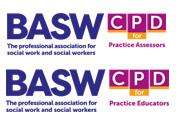
Keep your knowledge and skills up to date alongside like-minded professionals. A series of topic areas focused on helping educators and assessors provide first class support to students and newly qualified social workers.
Sessions are suitable for Practice Educators – (PEPS / PE Assessors, PEPS / PE Mentors, PEPS / PE Coordinators, Practice Mentor Assessors) and Practice Assessors (ASYE Assessors, NQSW Assessors, PAs of NQSWs, PAs of ASYEs, Supervisors of NQSWs, Supervisors of ASYEs).
Corporate multi booking rates available - contact ProfDE@basw.co.uk for more information.
“The level of interaction was good we had a good balance of being taught, group interactions and breaks”
